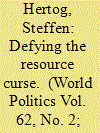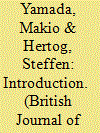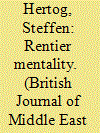| Srl | Item |
| 1 |
ID:
095085


|
|
|
|
|
| Publication |
2010.
|
| Summary/Abstract |
The article explains how several Gulf rentier monarchies have managed to create highly profitable and well-managed state-owned enterprises (SOEs), confounding expectations of both general soe inefficiency and the particularly poor quality of rentier public sectors. It argues that a combination of two factors explains the outcome: the absence of a populist-mobilizational history and substantive regime autonomy in economic policy-making. The authors concludes that it is necessary to rethink the commonly accepted generalizations both about rentier states and, arguably, about public sectors in the developing world.
|
|
|
|
|
|
|
|
|
|
|
|
|
|
|
|
| 2 |
ID:
171897


|
|
|
|
|
| Summary/Abstract |
This special issue revisits the ideas of rentierism, or rentier state theory (RST), advanced in Hazem Beblawi and Giacomo Luciani’s edited volume The Rentier State (1987), with particular focus on countries in the Gulf and Arabian Peninsula.1 Rentierism/RST, a theory that posits negative effects of external income and its distribution on political liberalism and economic development, has been serving as the dominant intellectual frame of reference for studies of resource-dependent countries in the Gulf and wider Middle East and North Africa region over the past three decades, both for scholars elaborating on it and for those critical of it.
|
|
|
|
|
|
|
|
|
|
|
|
|
|
|
|
| 3 |
ID:
171898


|
|
|
|
|
| Summary/Abstract |
The “rentier mentality” has been a key concept in rentier state theory since its development in the 1980s. It predicts that reliance on state patronage breaks the link between effort and reward, leads to low achievement orientation in economic life and makes citizens politically passive. Yet the rentier mentality hypothesis has hardly been empirically tested to date. This paper seeks to fill this gap through an analysis of a range of GCC survey data, including a previously unpublished survey of Saudi citizens’ labour attitudes. A key descriptive finding is that many GCC citizens do indeed evince rentier attitudes when it comes to concrete life choices – but at the same time, a disproportionate share of them claim to be generally in favour of hard work, competition, and a small state. When it comes to politics, levels of interest are unusually high, but are coupled with high levels of loyalty and confidence in government. These results mean that while some aspects of rentier mentality are indeed prevalent, other attitudinal predictions of rentier state theory do not hold up – potentially because rentier states have adapted since the 1980s and used a range of social engineering tools to instil pro-business and patriotic beliefs on an abstract, ideational level.
|
|
|
|
|
|
|
|
|
|
|
|
|
|
|
|